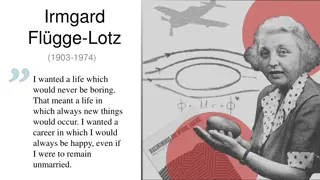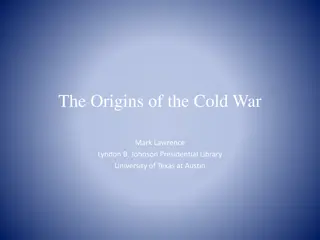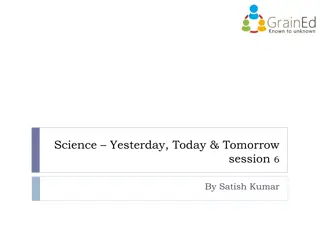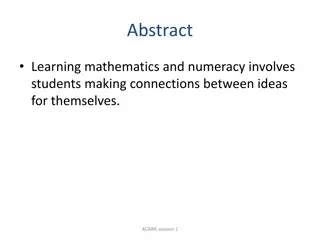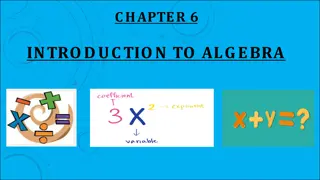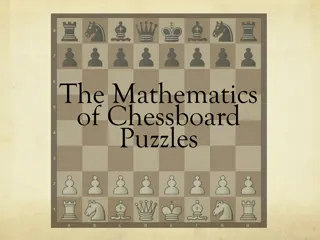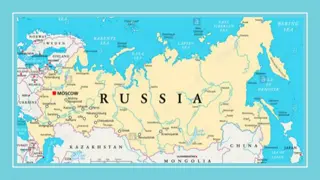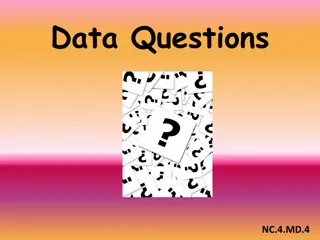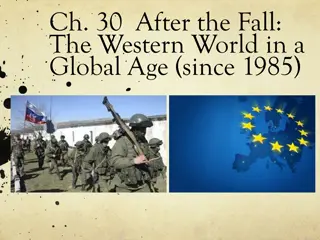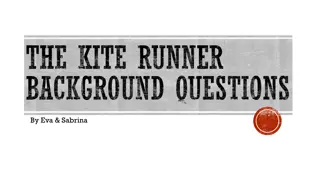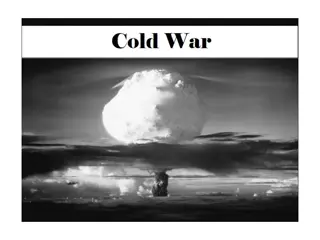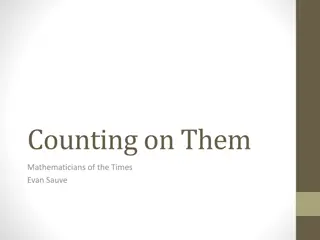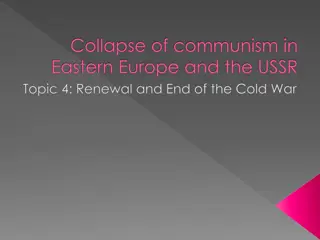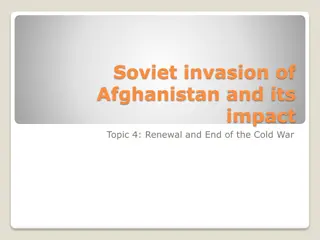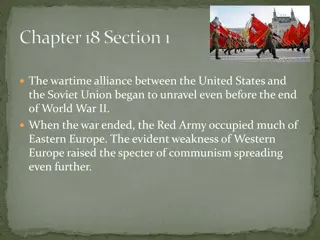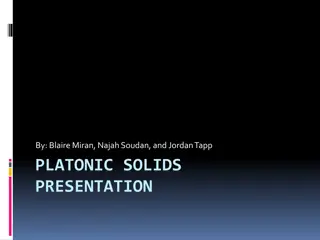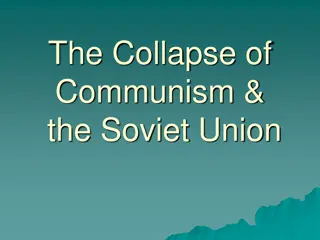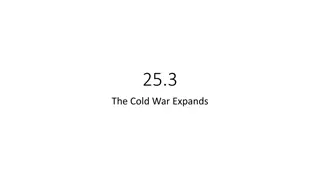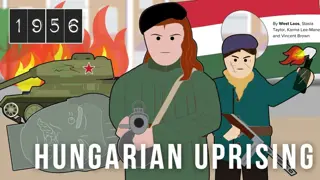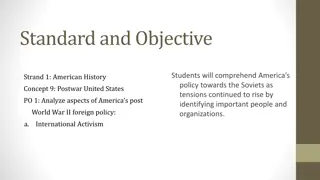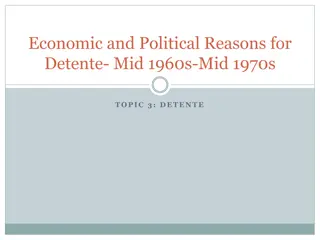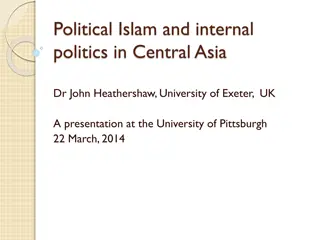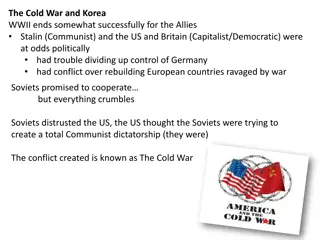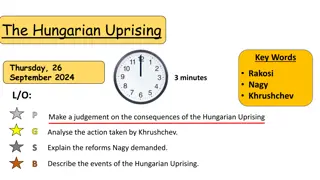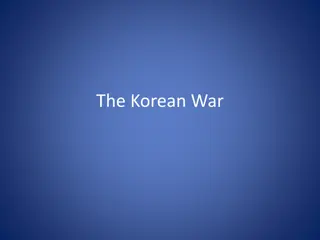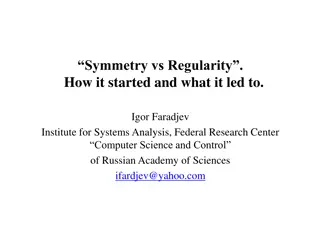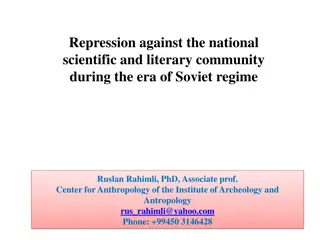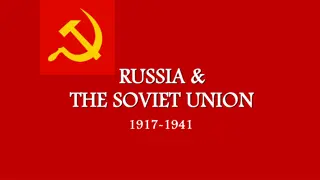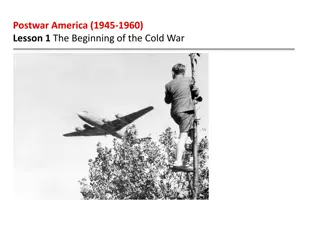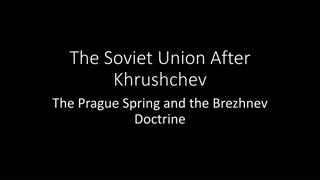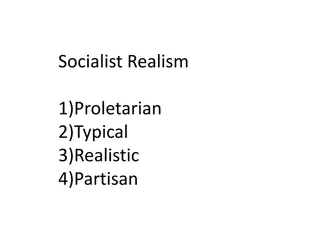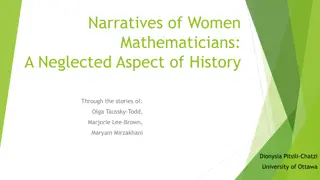Mathematicians
Explore the lives and contributions of renowned mathematicians like Pythagoras, Aristotle, Euclid, Al-Khwarizmi, Leonardo da Vinci, Galileo Galilei, De Lhopital, and Leonhard Euler. From ancient Greece to modern-day Switzerland, learn about their work in areas such as geometry, algebra, calculus, an
2 views • 10 slides
Exploring Global Literary Radicalisms in the Soviet Era
The passage delves into the life of Margulies, detailing his meticulous routine and contemplation of time in the Soviet context. It reflects on themes of industrial progress, historical backwardness, and the intertwining of time and life. Additionally, it references Stalin's vision for economic adva
2 views • 18 slides
[PDF⚡READ❤ONLINE] Energiya-Buran: The Soviet Space Shuttle (Springer Praxis Book
\"COPY LINK HERE ; https:\/\/getpdf.readbooks.link\/0387698485\n\nDOWNLOAD\/PDF Energiya-Buran: The Soviet Space Shuttle (Springer Praxis Books) | Energiya-Buran: The Soviet Space Shuttle (Springer Praxis Books)\n\"\n
1 views • 6 slides
Understanding Fractions: A Brief Historical Overview
Fractions have been integral to mathematics since ancient times, with civilizations like the Greeks utilizing them in various mathematical pursuits. This article explores the concept of fractions, their representation, and usage, along with historical insights into their development by ancient mathe
3 views • 15 slides
Trailblazing Mathematicians and Innovators in Engineering
Irmgard Flügge-Lotz, a German mathematician, made significant contributions to aviation theory and engineering, paving the way for future female engineers. Nina F. Thornhill, a British innovator, focuses on sustainable operation of industrial systems. Both women have received prestigious awards and
0 views • 15 slides
Researching at GARF: Accessing Soviet and Post-Soviet Documents
Explore the State Archive of the Russian Federation (GARF) for Soviet and post-Soviet documents accessible to both Russian and international researchers. Learn how to obtain a researcher pass, request materials, utilize electronic finding aids, and search for specific terms and files remotely. Disco
1 views • 16 slides
The Origins of the Cold War and U.S.-Soviet Antagonism
Amid post-World War II developments and contrasting ideologies, the Cold War emerged, marked by Yalta and Potsdam Conferences, the Truman Doctrine, the Marshall Plan, the Berlin Blockade, NATO's formation, and more. Various perspectives exist on the roots of U.S.-Soviet tensions, with the Soviet vis
1 views • 16 slides
Indian Contributions to Science: Yesterday, Today, and Tomorrow
Explore the rich history of Indian contributions to science, from ancient mathematicians like Aryabhatta to modern-day astronomers like Madhava. Discover the evolution of trigonometry, algebra, and astronomy in India, showcasing the brilliance of minds over the centuries.
0 views • 10 slides
Enhancing Mathematics Learning: ACARA Curriculum Session Insights
Learning mathematics and numeracy involves students making connections between ideas, aiming to develop expert mathematicians and users in various professions. The curriculum focuses on clarity and depth rather than rushing through topics, emphasizing understanding, fluency, problem-solving, and rea
0 views • 54 slides
Introduction to Algebra: Understanding the Basics and History
Algebra, a fundamental branch of mathematics, uses letters and symbols to represent numbers and quantities in equations. This chapter covers the history of algebra, from its origins in ancient Egypt to its development by mathematicians like Al-Khwarizmi and Viète. Students will learn to work with a
2 views • 45 slides
The Fascinating Mathematics Behind Knight's Tours and Chessboard Puzzles
Explore the intriguing world of Knight's tours and chessboard puzzles, from closed tours to open tours, with historical insights and mathematicians' quest for generalization beyond the standard 8x8 board. Delve into the challenges, solutions, and classifications that have captivated minds for centur
0 views • 19 slides
The Ruthless Reign of Joseph Stalin in the Soviet Union
Joseph Stalin rose to power in the USSR after Lenin's death, implementing totalitarian control through purges, collectivization, and propaganda. His regime led to millions of deaths, forced labor camps, and a cult of personality, shaping Soviet society through fear and oppression.
0 views • 8 slides
Understanding Categorical and Numerical Data in Mathematics
Explore the distinction between categorical and numerical data in math. Learn how mathematicians categorize and analyze data, sorting cards into different categories to understand similarities and differences. Develop perseverance skills by determining survey question types and defining data types w
0 views • 9 slides
The Fall of the Soviet Union: Gorbachev's Reforms and Global Impact
In the late 20th century, the collapse of the Soviet Union under Gorbachev's leadership ushered in a new era of economic, political, and social change. Gorbachev's policies of glasnost and perestroika opened up Soviet society, leading to nationalist movements and ultimately the dissolution of the US
0 views • 12 slides
Impact of Taliban and Soviet Occupation on Afghanistan
Life under the Taliban regime in Afghanistan was marked by strict rules and harsh restrictions, especially for women. The people faced curfews, limitations on education and work, and severe punishments for non-compliance. The Soviet occupation brought its own set of challenges, with significant chan
0 views • 5 slides
The Cold War: Rivalry and Tension Between Superpowers
The Cold War, lasting from post-World War II to the 1980s, was defined by political tension and rivalry between the United States and the Soviet Union. Despite never engaging in direct military combat, both sides competed through political maneuvering and propaganda, impacting global conflicts and t
0 views • 11 slides
Mathematicians Through Time: Pioneers in Mathematics
Delve into the lives and contributions of influential mathematicians throughout history, from Pythagoras and Euclid to Archimedes, Fibonacci, Descartes, and Isaac Newton. Learn about their groundbreaking discoveries, from the Pythagorean theorem to the Fibonacci sequence and the Cartesian plane, sha
8 views • 10 slides
Fall of Communism in Eastern Europe and the USSR: Renewal and End of the Cold War
The dissolution of the Soviet Union in December 1991 marked the end of an era, with the Revolution of 1989 seeing Soviet states revolt, culminating in the fall of the Berlin Wall symbolizing the collapse of Communism. Gorbachev's resignation on December 25th, 1991, swiftly followed by the dissolutio
0 views • 8 slides
Impact of Soviet Invasion of Afghanistan on the End of the Cold War
The Soviet invasion of Afghanistan in 1979 triggered a significant shift in international relations. The US responded with protests, sanctions, and support for Afghan rebels, leading to the collapse of detente. The conflict eventually led to the withdrawal of Soviet troops in 1990, contributing to t
0 views • 5 slides
The Unraveling of the Wartime Alliance and the Beginnings of the Cold War
The chapter delves into the breakdown of the wartime alliance between the United States and the Soviet Union post-World War II. Tensions rose as the Red Army occupied Eastern Europe and communism seemed to spread. The Marshall Plan's role in restoring Western Europe, coupled with events like the Cze
1 views • 15 slides
Advancement of Social Work in Post-Soviet Countries Conference
The 4th Conference on Advancement of Social Work in Post-Soviet Countries discussed future strategies for social work education, emphasizing the importance of developing knowledge domains, educating social workers, providing services, research, and policy-making. It highlighted the interdisciplinary
0 views • 19 slides
Exploring Platonic Solids: Shapes that Define the Universe
Delve into the world of Platonic solids, five unique geometric shapes that have fascinated mathematicians and philosophers throughout history. Discover the general characteristics of each solid - Tetrahedron, Cube, Octahedron, Dodecahedron, and Icosahedron - and unravel the ancient Greeks' profound
0 views • 27 slides
The Collapse of Communism and the Soviet Union: A Historical Overview
The collapse of communism in the Soviet Union was influenced by factors such as a home-grown insurgency, the rise of the Polish trade union Solidarity, and the reforms initiated by Mikhail Gorbachev. Solidarity, led by Lech Walesa, played a significant role, supported by the Catholic Church. Gorbach
0 views • 15 slides
The Cold War Expansion and Nuclear Arms Race
The Cold War intensified as the Soviet Union detonated an atomic bomb, leading to heightened tensions. Communist advancements, including the takeover of communist China, shocked the world. Nuclear arsenals expanded with the development of the hydrogen bomb, sparking concerns of an arms race. Eisenho
0 views • 17 slides
Hungarian Revolution of 1956: Impact on the Cold War
The Hungarian Revolution of 1956 marked a significant episode in the Cold War era, challenging Soviet dominance and leading to widespread consequences. The uprising, led by Imre Nagy, faced brutal Soviet suppression, resulting in thousands of casualties and reinforcing Soviet control over Hungary. T
0 views • 10 slides
America's Policy Towards Soviets in the Early Cold War Years
The early Cold War period saw heightened tensions between America and the Soviets, with key events like the Long Telegram and Crisis in Iran shaping America's containment policy. Diplomat George Kennan's Long Telegram highlighted Soviet insecurity, leading to the policy of containment. Crisis in Ira
0 views • 13 slides
Reasons for Detente in the Mid-1960s to Mid-1970s: Economic and Political Perspectives
Detente, a relaxation of tensions between the US and Soviet Union, was driven by economic and political factors. The nations aimed to limit the nuclear arms race, improve living standards, and establish peaceful relations. The Soviet Union faced economic challenges, leading to a focus on social refo
0 views • 9 slides
Political Islam and Internal Politics in Central Asia: Insightful Analysis by Dr. John Heathershaw
Dr. John Heathershaw from the University of Exeter, UK, presented on Political Islam and internal politics in Central Asia at the University of Pittsburgh in 2014. The presentation explores topics like Islamic-Secular dialogue, post-Soviet Muslim radicalization, and common claims about Political Isl
0 views • 20 slides
The Cold War and Its Impact: Truman Doctrine, Marshall Plan, and Iron Curtain
The Cold War emerged from the tensions between the Communist Soviet Union and the Capitalist Democratic US and its allies after WWII. The conflict led to the Western Bloc led by the US and the Eastern Bloc led by the Soviets. The US implemented the Truman Doctrine and Policy of Containment to preven
0 views • 14 slides
The Hungarian Uprising of 1956: Consequences and Reforms
The Hungarian Uprising of 1956 was a pivotal event in Hungary's history, marked by protests against Soviet oppression and the leadership of Matyas Rakosi. Khrushchev's decision to replace Rakosi with Imre Nagy reflected a shift in Communist leadership. The demands for free speech and withdrawal of S
0 views • 15 slides
The Korean War: A Conflict Dividing Nations
At the conclusion of World War II, Korea was temporarily divided into Soviet-occupied North and American-occupied South zones. The Korean War broke out in 1950 when North Korean troops crossed the 38th parallel. United Nations forces intervened, leading to a stalemate with Chinese involvement. Gener
0 views • 5 slides
Understanding and Checking Mathematical Proofs
Reading and understanding mathematical proofs involves careful analysis of logic and reasoning. Mathematicians and students use various strategies to ensure correctness, such as examining assumptions, following step-by-step logic, and verifying conclusions. This process is crucial for grasping the v
1 views • 79 slides
Symmetry vs. Regularity: Origins of Algebraic Combinatorics
Igor Faradjev recounts the origin of algebraic combinatorics in the 1968-1990 period at the Institute for Systems Analysis. He reflects on his personal experiences, relationships with key mathematicians, and the innovative work undertaken in the Mathematical Laboratory of the Institute for Theoretic
0 views • 49 slides
Repression Against Azerbaijani Intellectuals During Soviet Regime
The era of Soviet regime in Azerbaijan was marked by severe repression against the national scientific and literary community. From early Bolshevik governance in 1920 to the 1930s, countless individuals, including prominent intellectuals, government members, and ordinary citizens, faced unjust trial
0 views • 30 slides
Transformation of Soviet Society Under Stalin's Rule
Stalin's impact on Soviet society and culture was significant, with a mix of promoting change and continuity. This essay evaluates the extent of transformation in areas such as standard of living, attitudes, arts, ethnicity, gender roles, and family life. While Stalin's conservative policies reinsta
0 views • 28 slides
The Beginning of the Cold War: Postwar America (1945-1960) Lesson 1
Postwar America (1945-1960) Lesson 1 explores the unraveling of the wartime alliance between the United States and the Soviet Union, President Truman's response to Soviet aggression in Eastern Europe, and the causes and results of Stalin's blockade of Berlin. The background of the Cold War, Soviet a
0 views • 22 slides
The Soviet Union Post-Khrushchev: Prague Spring & Brezhnev Doctrine
Explore the aftermath of Khrushchev's ouster, the impact on the Cold War, shifts in Soviet foreign policy due to Vietnam, the Prague Spring in Czechoslovakia, and the rise of the Brezhnev Doctrine, along with key points and leadership changes during this period.
0 views • 19 slides
Soviet Socialist Realism: Artistic Representation of Revolutionary Development
Socialist Realism emerged as the fundamental method of Soviet literature and art, emphasizing truthful and historically concrete depictions of reality within a revolutionary context. It required artists to engage in ideological transformation and educate the masses in the spirit of socialism. This a
0 views • 21 slides
Unveiling the Untold Stories of Women Mathematicians
Delve into the narratives of Olga Taussky-Todd, Marjorie Lee-Brown, and Maryam Mirzakhani to explore the struggles, triumphs, and unique perspectives of women in the field of mathematics. These accounts challenge stereotypes, humanize the role of women mathematicians, and shed light on their journey
0 views • 7 slides
Christmaths Quiz - Fun Math Challenges for the Holidays
Engage in a Christmaths Quiz with rounds featuring math-themed challenges and trivia related to Christmas and mathematicians. Test your knowledge and skills in a festive and educational way. From matching mathematicians to creating snowflakes, there's something for everyone to enjoy during the holid
3 views • 11 slides


![[PDF⚡READ❤ONLINE] Energiya-Buran: The Soviet Space Shuttle (Springer Praxis Book](/thumb/21613/pdf-read-online-energiya-buran-the-soviet-space-shuttle-springer-praxis-book.jpg)

